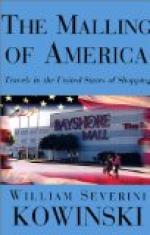raised the value of labour beyond the profits of almost
any manufacture. If they could be established
with effect in any part of America, it would be in
the
New England states, where the population
is more than double those of the south; and provision
much cheaper; but the New Englanders, when they fancy
themselves too populous, rather than engage in a laborious
trade, prefer emigration to the
Genasee[Footnote:
The Genasee is a rich tract of country, a considerable
distance west of New York, much resorted to by New
England emigrants since the peace with the Six Nations.
Kentucky is at least one thousand miles from the nearest
of the New England states, two hundred of which are
through a wilderness, which cannot be passed during
an indian war, without great danger.], or even Kentucky.
The same restless, enterprising spirit, which brought
their ancestors from Europe, carries them to these
remote western settlements; and I have no doubt their
descendants will continue the same in that direction;
till the Pacific Ocean[Footnote: A distance of
more than two thousand miles from the most remote
western settlement.] stops their further progress;
unless, as I before observed, lured by a
golden
bait, they go to the
south: let the
Spaniard look to that.—The manufactories
in this country that have fallen under my observation
are one of rifles at Lancaster, another of musquets
at Connecticut, and at German Town, in Pennsylvania,
a peculiar sort of winter stockings. An American
has lately procured a patent from Congress, for cutting
brads out of sheet iron with an engine. The american
iron is of an excellent quality, and possesses a great
degree of malleability, which perhaps suggested the
first idea of this invention. The following extract
from the advertisement of the patentee will enable
you, to form some judgment of this singular undertaking:
“He begs leave to observe their superiority
to english-wrought brads consists in their being quite
regular in their shape, so much so, that ten thousand
may be drove through the thinnest pine board, without
using a brad-awl, or splitting the board. They
have the advantage also of being cut
with the grain
of the iron; others are cut
against it.
He has already three engines at work, which can turn
out two hundred thousand per day.”
Another patent has been granted for making the teeth
of cotton and wool cards by an engine, which is supposed
to be a similar process.
There are also manufactories of cotton, sail cloth,
gun-powder, glass, &c., but of no great consequence.
Their sawing-mills are numerous, and well constructed;
this circumstance, and the great quantity of timber,
mast, spars, &c., with which this country abounds,
enable them to build vessels considerably under what
you can afford in England, though the wages of a shipwright
are now two dollars and a quarter per day. Theirs
ships, in point of model and sailing, if not superiour,
are at least equal to the best european-built vessels,
and when constructed of live oak, and red
cedar, are equally durable. Vessels of this
description are scarce. Live oak is rarely met
with north of the Carolinas: that used in the
Boston ship-yards is brought from Georgia; a distance
of more than a thousand miles,




